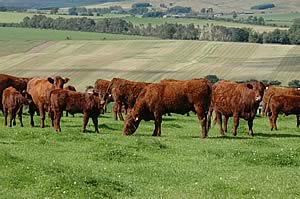2009-10-28
A world wide attack on climate change will fail if policy makers mistakenly identify red meat production as a front line reason for rising temperatures.
The National Beef Association, which is appalled at the simplicity of Lord Sterne’s well publicised, pre-Copenhagen conference analysis, which concentrates on methane reduction in the livestock sector and ignores much wider problems caused by the rapidly expanding global economy, and the daily encouragement given to consumers to raise the tempo of their every day demands.
“If the challenges raised by climate change are to be conquered citizens of the UK, Europe, and the developing world too, will have to address much more than meat eating and make, hugely uncomfortable decisions on the consumption of other, everyday products, they currently take for granted,” explained NBA director, Kim Haywood.
“For example coffee and cotton require more water than most other world crops, many times more than grass produced beef for example, but no one is calling for coffee drinking to be rationed or for curbs on the purchasing of cotton shirts.”
And the Association is determined to destroy the myth that a global move to eat less beef, and other red meats, will almost singlehandedly reduce methane output.
“Getting rid of cattle will not get rid of methane which will continue to be produced naturally whether cattle are involved or not,” warns Ms Haywood.
“Profound distinctions must be made between beef production in equatorial areas, which result in rain forest being unnecessarily trashed, and beef farming in the many parts of the world where grass grows naturally.”
“The NBA has always frowned on rain forest destruction but at the same time insists that if grass is not eaten by cattle, and left to rot instead, the result is that methane is simply produced another way.”
“It is well within the compass of livestock specialists to respond to the climate change challenge by developing cattle diets, with human food chain by-products for example, which reduce beef’s contribution to climate change and at the same time make a significant contribution to world-wide human health.”
“A panic struck stampede into vegetarianism is not a rational solution to a complex problem. People are omnivores and moderate beef consumption contributes to a balanced diet by combating anaemia and providing key trace elements and minerals.”
“It must also be recognised that fruit and vegetable production, which is also essential for sensible eating, is usually intensive and requires large fossil fuel inputs which make their own contribution to climate change.”
“It is the Association’s view that if consumers examined the combined impact of their expanding appetite for IT technology and gadgets, household appliances and transport, on climate change, they would realise that eating grass produced beef is not at the top of the list of urgent counter activities they ought to undertake,” Ms Haywood added.
 Aberdeen-Angus Females Outclass Males at Dungannon Aberdeen-Angus Females Outclass Males at Dungannon
 Fodder Launches Rare Breeds Roast Club Fodder Launches Rare Breeds Roast Club
 Countryside Live 2009 - Successful Show for Seventh Year Countryside Live 2009 - Successful Show for Seventh Year
|



